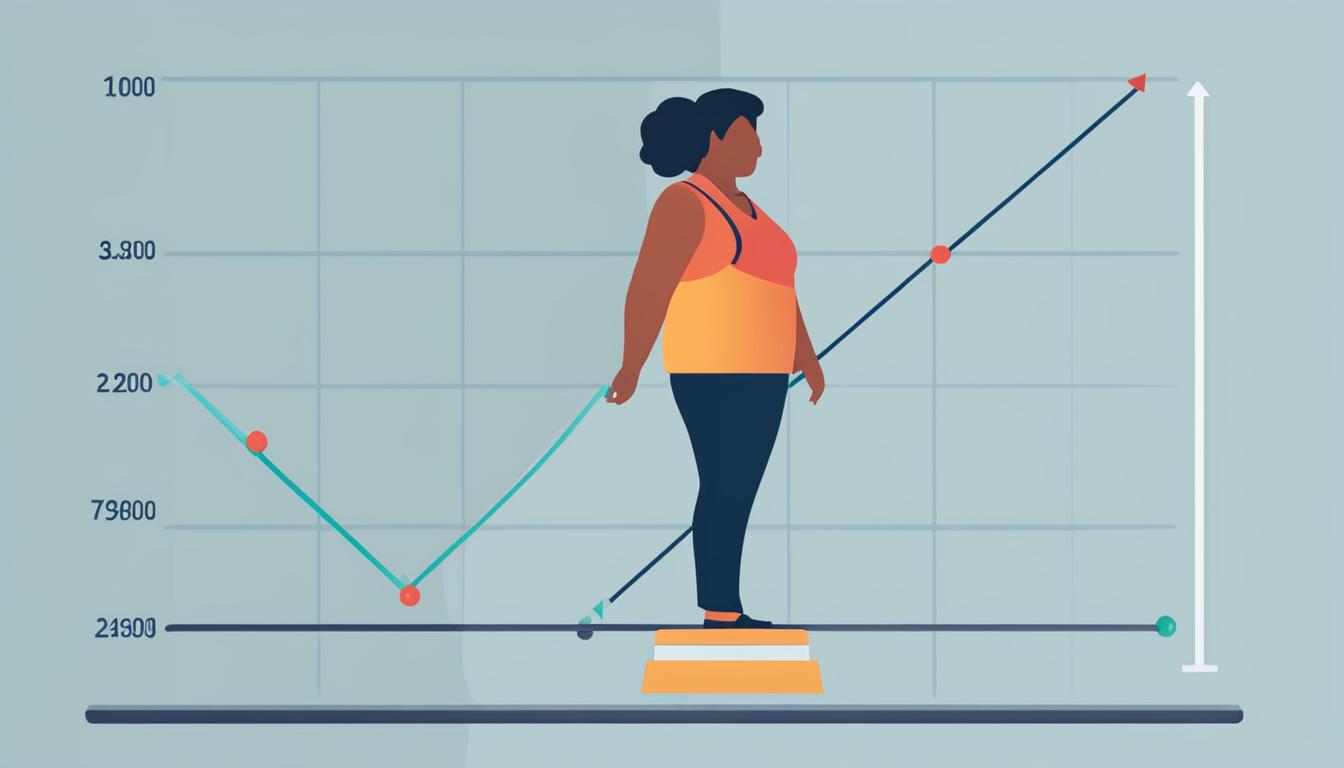A weight loss journey can be challenging, but with the help of a weight loss journal, you can stay on track and achieve your goals. A weight loss journal is a powerful tool that allows you to track your progress, set goals, and make meaningful changes to your habits. Whether you want to track your food intake, monitor your exercise regimen, or even keep an eye on your mood, a weight loss journal can provide the guidance and motivation you need for a healthier lifestyle.
Tracking your weight loss progress is crucial for staying motivated and accountable. With a weight loss journal, you can easily monitor your goals and celebrate your achievements along the way. By recording your daily activities and reflecting on your challenges and successes, you can make informed decisions that support your weight loss journey.
Key Takeaways:
- Track your weight loss progress with a journal to stay motivated and accountable.
- Set realistic goals and monitor your achievements to keep yourself on track.
- Use your weight loss journal to track your food intake, exercise routine, and emotional well-being.
- Meal planning and logging can help you make healthier choices and meet your nutritional needs.
- Track your water intake to ensure you stay hydrated throughout the day.
Setting Goals & Tracking Them
One of the most important aspects of a weight loss journal is setting goals and tracking your progress. By clearly defining your weight loss objectives and regularly monitoring your progress, you can stay motivated and focused on achieving your goals.
Setting specific and measurable goals is essential for success. Whether your goal is to lose a certain amount of weight, fit into a specific clothing size, or improve your overall fitness, it’s important to establish targets that are realistic and attainable.
Tracking your progress allows you to see how far you’ve come and provides a sense of accomplishment, which can boost your motivation. You can track your progress in different ways, such as recording your weight and measurements or keeping a record of your workouts and dietary choices.
When setting goals and tracking your progress, it’s essential to be consistent and honest with yourself. Regularly reviewing your progress will help you identify any obstacles or areas that need improvement, allowing you to make necessary adjustments to stay on track towards your desired outcome.
Remember, successful weight loss is not just about the numbers on the scale. It is a journey towards a healthier lifestyle. Setting goals and tracking your progress in your weight loss journal will not only help you achieve your desired weight but also help you make sustainable changes to your habits and improve your overall well-being.
Using a weight loss journal, whether in a traditional format or as a bullet journal, provides a dedicated space for setting and tracking your goals. It helps you stay accountable to yourself and provides a record of your journey.
The Benefits of Setting Goals & Tracking Progress
There are several benefits to setting goals and tracking your progress in your weight loss journal:
- Keeps you motivated: Having well-defined goals and regularly tracking your progress allows you to stay motivated and focused on achieving your desired outcomes. It helps you celebrate even small milestones along the way.
- Provides accountability: By tracking your progress, you hold yourself accountable for your actions and choices. It helps you identify any areas where you may be falling off track and allows you to make necessary adjustments to get back on course.
- Helps you make informed decisions: By consistently tracking your progress, you gain valuable insights into what is working and what may need adjustment. It allows you to make informed decisions about your diet, exercise routine, and overall weight loss strategy.
- Boosts self-awareness: Regularly tracking your progress helps you become more self-aware of your habits and behaviors. It allows you to identify any patterns or triggers that may be hindering your progress and make the necessary changes to overcome them.
- Celebrates achievements: Tracking your progress in your weight loss journal provides a visual reminder of the progress you’ve made. It allows you to celebrate your achievements, no matter how small, and serves as a source of motivation to keep pushing forward.
By setting goals and tracking your progress in your weight loss journal, you can create a roadmap for success and turn your weight loss journey into a fulfilling and rewarding experience.
Meal Planning
Meal planning is an essential component of a successful weight loss journey. By taking the time to plan your meals in advance, you can make healthier food choices and ensure that you are meeting your nutritional needs. Having a dedicated section in your weight loss journal for meal planning can help you stay organized and on track with your dietary goals.
Whether you prefer to plan your meals on a weekly or monthly basis, a meal planner in your weight loss journal can provide structure and guidance. You can jot down ideas for breakfast, lunch, dinner, and snacks, ensuring that you have a balanced and nutritious meal plan for each day.
Meal planning not only helps you make healthier eating choices, but it also saves you time and money. By knowing in advance what to prepare for each meal, you can create shopping lists and avoid spontaneous, less healthy food choices. Plus, you can save money by buying ingredients in bulk and utilizing leftovers creatively.
When meal planning, consider incorporating a variety of foods from different food groups to ensure you’re getting all the essential nutrients your body needs. Aim for a colorful plate with plenty of fruits, vegetables, whole grains, lean proteins, and healthy fats.
“Meal planning is an excellent way to stay organized and make conscious choices about the food you consume. It helps you avoid impulse decisions and stick to your healthy eating habits.”

With meal planning as part of your weight loss journal, you can easily refer back to your planned meals, track your progress, and make adjustments as needed. Whether it’s experimenting with new recipes, swapping ingredients to suit your dietary preferences, or adapting to unforeseen circumstances, your meal planning section in your weight loss journal provides a valuable resource for maintaining a healthy eating routine.
Meal Logging
Keeping a food diary or logging your meals in your weight loss journal can provide valuable insights into your eating habits and help you make healthier choices. By recording what you eat and drink, including portion sizes and calorie counts, you can become more aware of your eating patterns and make adjustments as needed.
With the help of your weight loss journal, you can track your food intake and make informed decisions about your diet. By diligently tracking your food and beverage consumption, you can identify any areas where you may be overindulging or not meeting your nutritional needs.
Tracking your meals also allows you to recognize any patterns between your food choices and how you feel physically and emotionally. You may discover that certain foods leave you feeling energetic and satisfied, while others may cause discomfort or lethargy.
Additionally, food logging can be particularly beneficial for those who are calorie counting or following specific dietary plans. By keeping a detailed record of your food intake, you can accurately monitor your calorie consumption and ensure that you are staying within your desired range.

By utilizing a weight loss journal to track your meals, you are equipping yourself with a powerful tool to support your weight loss journey. The insights gained from meal logging can guide you towards making more mindful food choices, help in identifying areas of improvement, and enable you to stay focused and motivated on your path to a healthier lifestyle.
Water Tracking
Staying hydrated is essential for weight loss and overall health. Including a water tracker in your weight loss journal can help you monitor your daily water intake and ensure that you are staying hydrated.
By tracking the amount of water you drink throughout the day, you can keep a record of your progress and make necessary adjustments as needed. Remember, adequate hydration plays a crucial role in supporting your weight loss goals and maintaining optimal bodily functions.
To accurately track your water intake, consult with your healthcare provider to determine the recommended daily fluid intake for your specific needs.
![]()
Having visual representation in your journal, like the image above, can serve as a reminder to drink water and help you stay consistent in your hydration efforts.
Workout Planning
Incorporating a workout planner into your weight loss journal can help you stay motivated and organized in your exercise routine. Whether you prefer to plan your workouts in advance or create a flexible schedule, having a dedicated section for workout planning can help you stay on track with your fitness goals. By setting specific workout goals and tracking your progress, you can make meaningful changes to your exercise regimen and see real results.
When it comes to workout planning, it’s important to consider your fitness level, preferences, and available time. By creating a workout plan tailored to your needs, you can ensure that you are engaging in activities that you enjoy and that align with your goals.
“Having a structured plan in my weight loss journal keeps me accountable and motivated to stick to my exercise regimen. It allows me to track my progress and make adjustments as needed.” – Melissa, weight loss enthusiast
Start by setting specific workout goals. Are you looking to improve your cardiovascular endurance, build strength, or enhance flexibility? Knowing your objectives will help you design an exercise regimen that targets those areas.
“Planning my workouts in advance gives me a clear direction and helps me stay consistent. It’s like having a personal trainer guiding me throughout my weight loss journey.” – Brian, fitness enthusiast
Be sure to select a variety of exercises that target different muscle groups and provide a well-rounded workout. Include aerobic exercises for cardiovascular health, strength training exercises for muscle toning, and flexibility exercises for improved mobility.
Tracking your progress is essential in evaluating the effectiveness of your workout plan. By keeping a record of your workouts in your weight loss journal, you can identify areas of improvement and celebrate milestones along the way. Use your journal to record the type of exercise, duration, intensity, and any other relevant details.
“Tracking my workouts in my weight loss journal not only helps me measure my progress but also serves as a source of motivation. Seeing how far I’ve come keeps me motivated to continue pushing myself.” – Sarah, weight loss journey
Remember, your workout plan is not set in stone. As you progress in your weight loss journey, you may need to adjust your exercises, increase the intensity, or add new activities to challenge yourself. Your weight loss journal can serve as a valuable tool in monitoring and adapting your exercise regimen.
Workout Tracking
Tracking your exercise progress is an essential part of any weight loss journey. By recording the details of your workouts, such as the type of exercise, duration, and intensity, you can monitor your progress and make adjustments as needed. Whether you choose to track your workouts using a planner, a journal, or a dedicated workout log, keeping a record of your exercise can help you stay accountable and motivated on your fitness journey.
When tracking your workouts, it’s important to include information that allows you to monitor your progress over time. Include the specific exercises you performed, the duration of each exercise session, and the intensity level. This information will help you see how your fitness level improves over time and identify areas where you may need to make adjustments.
A workout log can serve as a valuable tool for monitoring your progress and staying motivated. Use it to not only record your exercises but also to track any changes in weight, sets, or repetitions. This log will provide a clear picture of your progress and allow you to make informed decisions about your workout routine.
Having a dedicated section in your weight loss journal for workout tracking allows you to easily refer back to your previous workouts. It helps you stay consistent and aware of the efforts you put in and the progress you’ve made so far.
![]()
Remember, consistency is key when it comes to achieving your fitness goals. By regularly tracking your exercise and monitoring your progress, you can stay motivated and make necessary adjustments to your workout routine. So grab your weight loss journal, start logging your workouts, and watch your progress unfold!
Mood Tracking
Monitoring your mood and emotional well-being is a crucial aspect of weight loss and overall health. Understanding the connection between your emotions and eating habits can help you make positive changes towards achieving your weight loss goals.
One effective way to track your mood is by including a mood tracker in your weight loss journal. This allows you to record your emotions on a regular basis, giving you valuable insights into the patterns and triggers that may impact your eating behaviors and well-being.
By dedicating space in your journal to track your mood, you can identify any correlation between specific emotions and your food choices. For example, you may notice that you tend to reach for unhealthy snacks when feeling stressed or anxious. Recognizing these patterns can help you develop healthier coping mechanisms and make more mindful choices in the future.
“Tracking my mood in my weight loss journal has been eye-opening. I’ve noticed a direct correlation between my emotional well-being and my eating habits. It’s helped me become more aware of why I turn to food in certain situations and has motivated me to find healthier alternatives for emotional comfort.” – Emily
Additionally, mood tracking can help you identify emotional triggers that may lead to overeating or binge-eating episodes. By being aware of these triggers, you can work on developing strategies to manage them effectively, such as practicing relaxation techniques, engaging in physical activity, or seeking support from a therapist or counselor.
The information gathered through mood tracking can be a powerful tool in supporting your weight loss journey. It provides you with a deeper understanding of your emotional relationship with food, enabling you to create a more balanced and mindful approach to eating.
![]()
Incorporating mood tracking into your weight loss journal:
1. Designate a dedicated section for mood tracking in your journal.
2. Use a scale or a selection of emoticons to record your mood each day.
3. Reflect on your mood patterns and any noticeable triggers for specific emotions.
4. Consider incorporating stress-reducing techniques, such as meditation or journaling, to help manage emotional eating.
5. Celebrate your progress by acknowledging positive shifts in your emotional well-being.
Remember, your weight loss journey encompasses not just physical changes, but also emotional well-being. By tracking your mood, you can gain valuable insights that contribute to your overall success in achieving a healthier lifestyle.
Journal Prompts for Weight Loss Success
Journal prompts can be a valuable tool in your weight loss journey. By engaging in self-reflection and addressing your motivations, challenges, and successes, you can gain a deeper understanding of yourself and your weight loss goals.
Incorporating journal prompts into your weight loss journal can help you stay motivated, overcome obstacles, and celebrate your achievements. Self-reflection allows you to identify patterns, triggers, and emotions that may influence your eating habits and overall well-being.
Use the following journal prompts to guide your self-reflection:
- “What are my primary motivations for losing weight? How do these motivations align with my overall health and well-being?”
- “What challenges have I faced on my weight loss journey? How have I overcome them? What strategies can I implement to overcome future challenges?”
- “What diet and exercise habits have contributed to my success? How can I build upon these habits to continue progressing towards my weight loss goals?”
- “How does my mood impact my food choices? How can I foster a positive emotional relationship with food to support my weight loss journey?”
- “What non-food-related activities bring me joy and fulfillment? How can I incorporate more of these activities into my daily life to enhance my overall well-being?”
- “What are some small, achievable goals I can set for myself each week? How will achieving these goals contribute to my long-term success?”
Remember to personalize the prompts to suit your individual needs and preferences. Use your weight loss journal as a safe space for self-reflection, motivation, and growth.

Boosting Accountability with Weight Loss Journal Prompts
Accountability is an essential element for achieving successful weight loss. To stay accountable to yourself and make meaningful changes to your habits, consider using journal prompts that focus on tracking your food intake, exercise routines, and emotions. These prompts can help you stay motivated and make the necessary adjustments to achieve your desired weight loss results.
By incorporating specific journaling techniques into your weight loss journal, you can address your goals, challenges, and progress. The act of tracking your food intake can provide valuable insights into your eating patterns and help you make healthier choices. Similarly, tracking your exercise routines allows you to monitor your progress and adjust your fitness goals accordingly. Additionally, by journaling about your emotions, you can gain a better understanding of how your mood may impact your eating habits and overall well-being.
For example, you can use prompts such as:
Did I stick to my planned meals today? Why or why not?
How did I feel emotionally before and after exercising? How did it impact my mood?
What challenges did I face today in terms of maintaining a healthy lifestyle? How did I overcome them?
What progress have I made towards my weight loss goals? How does it make me feel?
Journaling techniques like these can help you stay on track, hold yourself accountable, and make adjustments along the way. Embracing a sense of self-awareness and reflection can motivate you to stick to your weight loss journey and make the necessary lifestyle changes.

Stay motivated with weight loss journal prompts
Tracking your progress and staying accountable to yourself can be challenging at times. However, utilizing weight loss journal prompts can help you stay motivated and focused on your goals. By consistently reflecting on your actions and expressing your thoughts and feelings through journaling, you can boost your accountability and turn your weight loss aspirations into reality.
Conclusion
In conclusion, incorporating a weight loss journal into your healthy lifestyle can have a significant impact on your weight loss journey. By diligently tracking your goals, meals, food and water intake, workouts, mood, and using journal prompts, you can take control of your habits and achieve real results. The power of self-reflection and accountability offered by a weight loss journal can provide valuable insights into your progress and help you make meaningful changes to support your weight loss goals.
Remember, personalizing your weight loss journal according to your preferences and needs is essential. Make it a tool that motivates and inspires you on a daily basis. Additionally, it’s always beneficial to consult with a trusted healthcare professional who can offer personalized advice and guidance throughout your weight loss journey.
Start your weight loss journaling today and embark on a transformative journey towards a healthier and more fulfilling life. By tracking your weight loss journey, you’ll not only achieve your goals but also gain a deeper understanding of yourself and develop sustainable habits for long-term success. Experience the power of weight loss journaling and take charge of your health and well-being.
FAQ
What is a weight loss journal?
A weight loss journal is a tool used to track your progress and make meaningful changes to your habits in order to achieve your weight loss goals.
How can a weight loss journal help me achieve my goals?
By setting and tracking goals, planning meals, logging food and water intake, planning and tracking workouts, monitoring mood, and using journal prompts, a weight loss journal can help you stay motivated and make informed decisions on your weight loss journey.
How does meal planning fit into a weight loss journal?
Meal planning is an important aspect of successful weight loss. By having a dedicated section in your weight loss journal for meal planning, you can make healthier food choices, ensure you are meeting your nutritional needs, and stay organized and on track with your dietary goals.
Why should I log my meals in my weight loss journal?
Logging your meals in your weight loss journal can provide valuable insights into your eating habits, help you make healthier choices, and become more aware of your eating patterns. It allows you to track your food intake and make informed decisions about your diet.
How can water tracking be beneficial in a weight loss journal?
Staying hydrated is important for weight loss and overall health. Including a water tracker in your weight loss journal helps you monitor your daily water intake and ensure you are staying hydrated. It allows you to track your progress and make adjustments as needed.
Why should I incorporate a workout planner into my weight loss journal?
Incorporating a workout planner into your weight loss journal helps you stay motivated and organized in your exercise routine. It allows you to set specific workout goals, track your progress, and make meaningful changes to your exercise regimen for real results.
How can tracking my workouts in a weight loss journal be helpful?
Tracking your workouts in a weight loss journal allows you to monitor your progress, make adjustments as needed, and stay accountable and motivated on your fitness journey. Whether you use a planner, journal, or dedicated workout log, keeping a record of your exercise helps you stay on track with your goals.
Why is mood tracking important in a weight loss journal?
Monitoring your mood and emotional well-being is crucial for weight loss and overall health. Incorporating a mood tracker in your weight loss journal helps you identify patterns and triggers that may affect your eating habits and well-being. It allows you to make positive changes to support your weight loss goals.
How can journal prompts contribute to weight loss success?
Journal prompts in your weight loss journal provide a valuable tool for self-reflection. By engaging in self-reflection and addressing your motivations, challenges, and successes, you gain a deeper understanding of yourself and your weight loss goals. Journal prompts help you stay motivated, overcome obstacles, and celebrate achievements.
How do journal prompts boost accountability in weight loss?
Journal prompts that focus on tracking food intake, exercise routines, and emotions help you stay accountable to yourself and make meaningful changes to your habits. Using specific prompts that address your goals, challenges, and progress boosts motivation and enables you to make necessary adjustments for successful weight loss.
How can a weight loss journal contribute to a healthy lifestyle?
A weight loss journal serves as a powerful tool for tracking your weight loss journey and making meaningful changes to your habits. By setting goals, planning meals, logging food and water intake, tracking exercise, monitoring mood, and using journal prompts, you can achieve your weight loss goals and maintain a healthy lifestyle.


